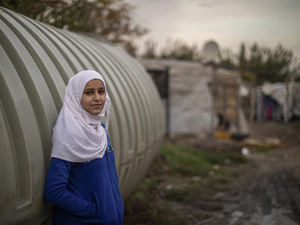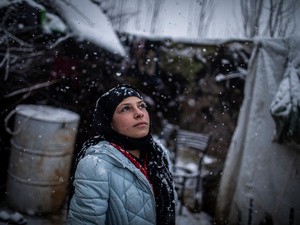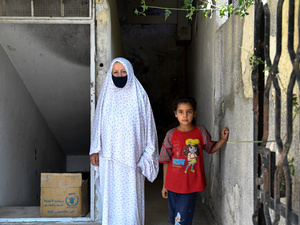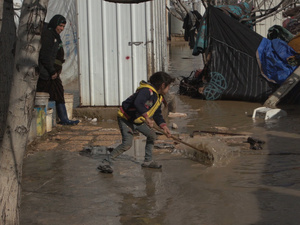UNHCR: Over 5 million may need shelter support in Syria after quake
UNHCR: Over 5 million may need shelter support in Syria after quake

Relief items are distributed to families staying at a mosque in the Suleiman Al-Halabi neighbourhood of Aleppo, Syria, on 8 February 2023.
Preliminary data suggests that as many as 5.3 million people in Syria may have been affected by the recent earthquake and will need some form of shelter assistance, and UNHCR, the UN Refugee Agency, has been rushing aid to the badly impacted parts of the country. UNHCR is focusing very much on shelter and relief items, ensuring that collective centers that displaced have gone to have adequate facilities, as well as tents, plastic sheeting, thermal blankets, sleeping mats, winter clothing and so on.
We have been distributing them since day one – last night we gave out 9440 kits – focusing, of course, on all those impacted by the earthquake, but also trying to understand who among the affected are the most vulnerable: the elderly, those with disabilities, children. And of course, there are some children who've been separated from their parents.
We are also leading in the protection sector here. Throughout Syria we have a network of community centres, satellite centres, outreach volunteers, and this helps us reach vulnerable populations. We've set up hotlines for all sorts of protection-related issues, which we use.
For Syria, this is a crisis within a crisis. We've had economic shocks, COVID and are now in the depths of winter, with blizzards raging in the affected areas. A number of our own staff are sleeping outside their homes because they are worried about the structural damage to their homes. This is just a microcosm of what is happening throughout the affected areas.
All this, of course, impacts the access for aid. Roads have been damaged and that hampers us trying to reach people. It's been very, very difficult. There are 6.8 million people already internally displaced in the country. And this was before the earthquake.
For now, we are looking at life-saving activity, you know, the adaptation of the collective centers, tents, non-food items and so on. Then we will look – over the next 8 to 12 weeks – at supporting livelihoods and basic services in affected areas, shelter support provision and the installation of emergency shelter kits and minor repairs to damaged housing. We'll look at debris removal, trying to support authorities and partners with equipment and capacity, mobilizing engineers, and how we could support the community in assessing some of the structural damage and looking at the way forward also with their livelihood opportunities.
In the northwest of Syria – which is especially badly hit – access has been badly impeded by the damage. What we call ''cross line" supplies (from government areas into the NW) made it through before the quake – and these had been pre-positioned and are being distributed from warehouses. From now, we hope that an agreement with the Government will allow for fast and regular access to these areas.
We have just had a preliminary estimate that 5.37 million people affected by the quake will need shelter assistance in the whole of Syria. That is a huge number and comes to a population already suffering mass displacement.
Next week I will head to Aleppo, Hama and Latakia, where we have the pre-positioned stocks of 30,000 core relief items and 20,000 tents. To echo the words of the UN Secretary General, speaking last night: This is about people. That is all that matters.
Note: The headline and lead of the initial note have been edited to clarify that the figure represents an estimate of people who will need shelter assistance, rather than people who may be displaced from their homes.
For more information on this topic, please contact:
- In Türkiye, Selin Unal, [email protected], +90 530 2827862
- In Amman (MENA Regional), Rula Amin [email protected], +962 790 04 58 49
- In Geneva (Europe Regional), Louise Donovan [email protected], +41 792173058
- In Geneva, Matthew Saltmarsh [email protected], +41 79 967 99 36, Shabia Mantoo [email protected], +41 79 337 7650, Yuko Narushima [email protected] +41 79 863 7327
- In New York, Kathryn Mahoney [email protected], +1 347 574 6552
For B-roll, please visit Refugees Media: https://media.unhcr.org/Share/k84ad5y06lh287226utxcr337ir033vk
Support our work here.












